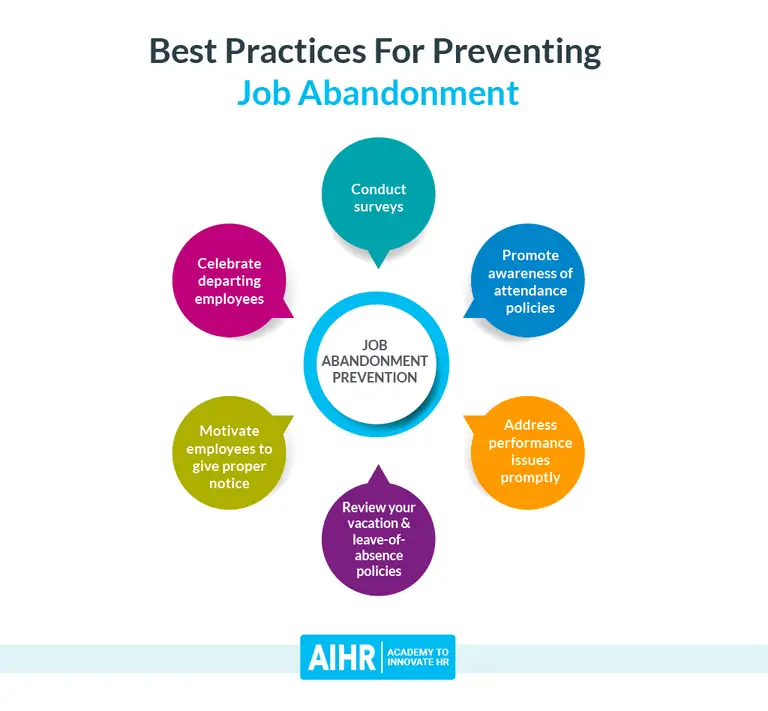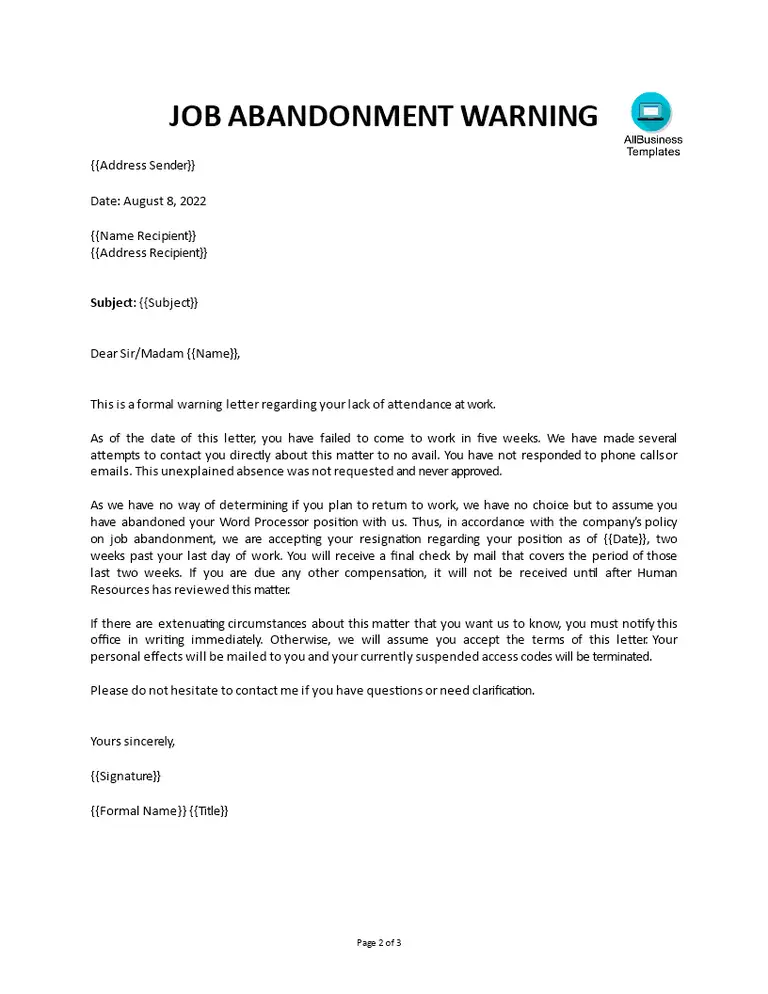Managing employees can be tough work. And as challenging as today’s job climate is, there could be people who simply stop showing up for work at once, effectively resigning from their job.
This is something called job abandonment and it can cause immense issues for employers. Identifying it and preventing it should be a top priority for any employer or human resources team, even if you’ve never encountered it before.
Today, we’ll tell you all you need to know about job abandonment, from spotting it to stopping it.
What is job abandonment?
Job abandonment is the act of quitting a job without sending in a job abandonment letter. Reasons for job abandonment can vary, but can often stem from personal issues, medical reasons, or lack of satisfaction with the job.
Job abandonment (also called involuntary termination) is usually regulated through a job abandonment policy. This company policy covers how many business days of absence is considered abandonment, what happens with unemployment benefits, what the consequences of job abandonment are for the employee and more.
For employers, job abandonment can cause serious workplace issues. Besides having to cover for the workload of the missing employee, employers commonly need to warn, suspend, or let go of employees who have unexcused absences.
In some cases, job abandonment can simply mean that an individual employee is having problems (medical emergency, family situation, or some other reasonable explanation such as a natural disaster). However, if it keeps occurring and you have consecutive absences, it means that you may have problems within the company that need addressing before the problem escalates.
What causes job abandonment?
There are many causes for job abandonment, but the following are the most common:
- Poor management - employees leave because the management is bullying or pressuring them
- Lack of job satisfaction - employees are not satisfied with their job or career progression
- Poor working conditions - anything from the lack of basic work equipment to working in unsatisfactory surroundings
- Inability to advance in the organization - no possibilities for promotions or salary raises
- Toxic work environment - employees are surrounded by coworkers who do not support them in their everyday work, cases of employee mobbing
- Lack of opportunities for growth - no chances to learn new skills or familiarize yourself with new tools or processes
- Lack of support from management - no support in everyday activities or larger initiatives, poor employment relationship with their direct managers
- Poor communication between the absent employees and management - no clear guidelines or expectations communicated from the top down
- Harassment or discrimination at work - various forms of verbal or non-verbal violence and discrimination
- Poor work-life balance - working long hours with no breaks, frequent unpaid overtime

What is considered job abandonment?
There is no single answer to this question, as job abandonment can take on a variety of different forms.
However, generally speaking, job abandonment refers to any situation in which an employee quits their job without informing their employer of their intentions with the help of a job abandonment letter and other termination procedures.
This can range from simply quitting their job without notice, to sending in a formal resignation letter, to simply not coming to work. Managers use different methods to track employee records including the use of online time trackers.

An example of a job abandonment letter. Source
Examples of job abandonment
Examples of job abandonment include quitting a job after only a few weeks on the job, quitting a job after working for several months, and quitting a job after years of service. Job abandonment can occur for a number of reasons, including:
- Feeling overwhelmed or stressed by the job: If the job is too difficult or overwhelming, the individual may decide to abandon it.
- Feeling unsupported or unappreciated by the employer: When the employer does not provide the necessary support or feedback to help the employee feel productive and happy at work, the employee shows resentment and decides to leave the job.
- Feeling like the job is not a good fit for the individual: The job may not be a good match for the skills and talents of the individual. In such cases, the individual may decide it’s time to look elsewhere and find a place with better company values.
- Feeling like the job is not providing enough opportunity for advancement: The individual is motivated by promotion and when that does not happen for a long period of time, the individual feels there are not enough opportunities for growth and development. The employee will then consider abandoning the job.
- Feeling like the job is not providing a good quality of life: When the job does not provide the necessary work-life balance features (for example, enough time for personal hobbies and interests), the employee seeks better prospects elsewhere. This is one of the more common reasons for abandonment.
- Feeling like the job is not providing a fair salary: Employees need a steady rise in salary to keep up with an increasing cost-of-living index. When this does not happen, the individual may decide to abandon the job.
- Feeling like the job is not providing good benefits: If the individual feels that the benefits are not up to expectations, then the individual may look for better benefits at another job.

Whichever of these may happen, the first course of action is to get in touch with the employee to find out the reasons for their absence. In case the employee is not available, reach out to an emergency contact which they should leave with you when they begin their employment.
They may have a reasonable excuse for missing out, so hear them out before pulling out your absence policy.
Is job abandonment illegal and does it go on record?
Job abandonment is a very serious matter that can have serious consequences on an employee’s record.
If an employee quits their job without justifiable cause, they may be guilty of harassment or some other form of breaking the absence policy. Additionally, if this is the only employee at your company who quits, then the company may be legally obligated to fill that position.
Yes, job abandonment can actually be considered a criminal act in some cases. If an employee is fired, quits, or leaves a job without good reason, the employer may be able to take legal action against them after issuing a termination of employment letter.
For an employee, this could mean a tarnished record and they could have difficulties finding another job in the future.
Job abandonment consequences
If you're considering job abandonment, it's important to weigh the consequences carefully. If you decide to abandon your job, be sure to have a solid reason for doing so.
When you decide to leave your job, it's important to remember that your employer has a right to enforce the terms of your contract under the company’s job abandonment policy.
When you break your contract or do not send in a job abandonment letter with a suitable reason, your employer may be able to pursue legal action to get back what you owe them. So, be sure to take your time and think things through before walking away from your job.
And, be sure to speak to a legal representative before making any decisions.
How to deal with job abandonment?
There are a number of things that an individual can do to prevent or reduce the chances of job abandonment, including:
Look for support and positive feedback from the employer
If the individual feels that the job is not providing the necessary support to help the employee feel productive and happy, look for positive feedback from the employer. The employer will contact the employee in such cases and offer feedback that can help the individual understand and appreciate the job more and may lead to a stronger connection with the employer.
Seek out opportunities for growth and development at the job
If the individual feels that the job does not offer opportunities for growth and development, it is helpful to seek out such opportunities at the job. This may lead to a stronger connection with the job and increased satisfaction with the work.
Find ways to reduce the amount of stress at the job
When the individual feels that the job is too difficult or overwhelming, it is helpful to find ways to reduce the amount of stress at the job. This may include taking breaks, seeking out support resources, or changing the job or work schedule.
Improve the work-life balance at the job
When the work-life balance goes for a toss, it’s best to look for ways to improve the work-life balance at the job. This may include finding ways to balance work and personal interests, adjusting work hours, or taking advantage of employee benefits.
Seek out ways to improve the work environment
If the individual feels that the work environment is not good, go out of the way to improve the work environment. This may include adjusting work hours, attending company meetings, or working with the employer to improve the work environment. Use time tracking software to adjust the work hours.
Job abandonment can lead to a number of negative outcomes for employees, including decreased income, increased debt, and decreased stability in one's life.
On the other hand, you need to protect yourself as an employer too because this absence without notification can and will affect your workflows and the everyday lives of your employees.
Understanding and Managing Job Abandonment
Job abandonment occurs when an employee fails to report to work for an extended period without notifying their employer. This situation can cause significant disruptions in the workplace, making it crucial for companies to have a clear job abandonment policy in place.
What Constitutes Job Abandonment?
- Legal Definition: The legal definition of job abandonment varies, but it generally involves an absent employee who does not communicate with their employer for a certain number of days.
- Specific Job Abandonment Laws: Different regions have specific job abandonment laws that define the duration and circumstances under which an absence qualifies as job abandonment.
Creating a Job Abandonment Policy:
- Employee Handbook: Include a job abandonment policy in the employee handbook to ensure all employees are aware of the procedures and consequences.
- Establishing Procedures: Clearly outline the established termination procedures for handling job abandonment. This includes steps like attempting to contact the employee and documenting the absence in the employee's file.
Steps to Take When Job Abandonment Occurs:
- Contact the Employee: Make efforts to reach out to the absent employee to determine if there is a valid reason, such as a medical or family emergency.
- Document the Absence: Keep detailed records of the employee’s absence and attempts to contact them.
- Termination Procedure: Follow the company’s termination procedure if the employee does not respond within the specified timeframe. This ensures compliance with specific job abandonment laws.
- Final Paycheck: Process the final paycheck and recover any company property from the employee.
Preventing Job Abandonment:
- Communication: Encourage open communication and provide clear guidelines on how to report absences, especially in cases of a family emergency or other urgent matters.
- Employee Support: Offer support for employees facing personal challenges to help prevent job abandonment.
- Clear Policies: Ensure all employees understand what constitutes job abandonment and the consequences outlined in the employee handbook.
Legal Considerations:
- Wrongful Termination Claim: Proper documentation and adherence to established termination procedures can help protect the company from a wrongful termination claim.
- Voluntary Resignation: In many cases, job abandonment is considered a voluntary resignation, which should be clearly stated in the job abandonment policy.
By implementing a clear and comprehensive job abandonment policy, employers can manage and prevent job abandonment effectively, ensuring a smooth and legally compliant process.
Wrapping up
Job abandonment is a massive problem both for employees and employers. If you’re an employer wondering if there is job abandonment happening in your organization, it�’s best to investigate it and stop it early in its tracks. By the time you find out someone has abandoned their job, it might be too late so stop the cause of the problem.
And one of the best starting points to determine if an employee is working is to track their time. With Unrubble, you can see how much time someone has worked every day, week or month. Start tracking your employees’ time today to stop job abandonment early in its tracks.
Job abandonment: frequently asked questions
What is the most common consequence of job abandonment?
If an employee abandons their job, they can usually expect to get warned, suspended or in the worst case, have their employment contract terminated. In any case, employees without an acceptable explanation for their absence for a number of consecutive work days should expect disciplinary action.
What is the difference between a resignation and job abandonment?
When resigning, an employee officially tells you that they are leaving a job, verbally or in written form. With job abandonment, an employee simply stops showing up for work without any warning or notice.
Do I need a job abandonment policy in my workplace?
Most definitely. This policy tells employees how much time has to pass before their unauthorized absence is officially considered job abandonment. It also touches upon topics such as company property, employees’ personal belongings, and the general consequences of abandonment.
Are there any job abandonment laws in place around the world?
For the most part, no, there are no such employment laws. However, if you have an employment contract with an employee, there are legal issues around that employment contract that you need to consider. However, please consult a professional for legal advice pertaining to your area.

![How To Evaluate HR Transformation Effectiveness [2026 Guide]](/static/image?src=https%3A%2F%2Fcdnblog.unrubble.com%2Fpayload-unrubble-images%2FUnrubble-how-to-evaluate-hr-transformation-effectiveness-2026-guide-180x120.jpg&width=128&height=128&fit=cover&position=center&quality=65&compressionLevel=9&loop=0&delay=100&crop=null&contentType=image%2Fwebp)






